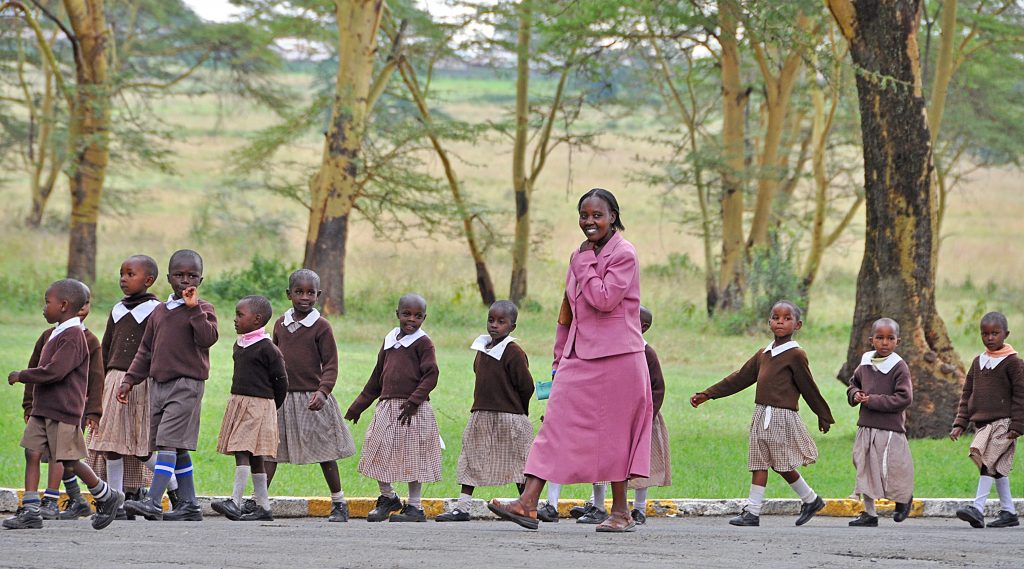In 2018, the Ministry of Environment and Forestry officially joined the One UN Climate Change Learning Partnership (UN CC:Learn) in a bid to strengthen Kenya’s human resources and skills to advance the national climate change agenda. This set off a process to develop the National Climate Change Learning Strategy led by the Climate Change Directorate under the Ministry of Environment and Forestry, in partnership with UN CC:Learn, FAO Kenya, Kenya Climate Change Working Group, and the Ministry of Education. The Climate Change Learning Strategy seeks to systematically analyse existing policies and initiatives around climate change learning, assess the needs and capacities of national institutions to deliver climate change learning, and create strategic entry points for measurable and impactful actions that will enhance individual, institutional and systemic capacity on climate change. The result would be a citizenry that drives a low emission, climate-resilient development pathway.
The strategy development process kicked off with the development of the Background Report on National Climate Change Priorities and Relevant Capacity Development Goals and Plans in Kenya. The report reviews existing policies and frameworks on climate change, analyses the initiatives implemented by various actors in the climate change learning space, note the gaps, and provides recommendations for the Strategy. On 15th June 2020, the Climate Change Directorate convened the first virtual meeting with critical stakeholders from government, civil society, academic institutions, private sector, and development partners to review and validate the Background Report. It was a rich exchange with substantive input from participants on the key outcomes of the report, from the challenges experienced in climate change learning in the formal, non-formal, and informal sectors of education and training to subsequent interventions that the Strategy could address. The Report highlights the Climate Change Act of 2016 which places responsibility on national and county governments to address climate change and facilitate capacity development. National institutions like the Kenya School of Government are working with various partners to build the capacity of county government officials to mainstream climate change into local development planning and getting people at the local level actively engaged in climate change learning while at the same time building their resilience.
The Report highlights the Climate Change Act of 2016 which places responsibility on national and county governments to address climate change and facilitate capacity development. National institutions like the Kenya School of Government are working with various partners to build the capacity of county government officials to mainstream climate change into local development planning and getting people at the local level actively engaged in climate change learning while at the same time building their resilience.
Representatives from institutions of higher learning, including the Commission on University Education, shared insights concerning the decreasing number of students in public universities enrolling in climate change and food security-related courses over time, despite these bring national priority areas for sustainable development. Reflections from The University of Nairobi’s Institute for Climate Change Adaptation that has adopted a trans-disciplinary approach towards mainstreaming climate change into the curricula see climate change as a complex societal issue and thus the need for cross-disciplinary actions to integrate climate change in courses from undergraduate level. Non-formal networks like high school Water Clubs involving young learners actively in practical climate change learning applications have also proven effective.
COVID-19, being the very big elephant in the room, has shifted business as usual with UNESCO reporting over 60% of students worldwide disrupted from school. As countries begin to forge the new normal, a key consideration for the Strategy would be the support towards recovery and strengthening virtual learning, focusing on key issues like climate change that is available to all learners. UN CC:Learn offers a wide variety of e-learning courses on climate change and provides partner countries the opportunity to access these resources. The Kenya Institute of Curriculum Development (KICD), Ministry of Education, and the Ministry of Environment and Forestry have embarked on preparing guidelines to mainstream climate change into the curriculum in consultation with key stakeholders.
In Technical and Vocational Education and Training (TVET) Institutions, the TVET Authority highlighted ongoing efforts to green TVET institutions as highlighted in the Report. Although there have been challenges that have slowed progress, the Authority is seeking to find solutions towards greening the TVET curriculum that the Strategy can incorporate, including accreditation and certification of climate change courses in TVETs.
Pursuant to the Leave No One Behind principle of the 2030 Sustainable Development Agenda, participants reflected on the importance of ensuring that vulnerable groups including women, youth, the elderly, persons with disabilities, marginalized communities, and indigenous groups are part and parcel of the Strategy. The National Gender and Equality Commission (NGEC) highlighted the significance of addressing the unique socio-cultural challenges facing women and girls in the context of climate change learning. The Climate-Smart Agriculture Youth Network (CSA-YN) recognized the importance of going beyond merely mentioning the youth as key actors, but having them contribute to important processes such as the Learning Strategy. Globally and at the local level, the youth are bringing leaders to task on addressing the climate crisis and as such, are central towards climate change learning. The Mainyoito Pastoralists Integrated Development Organization (MPIDO) noted that Kenya has the opportunity to tap into indigenous traditional knowledge through informal education networks at the community level and integrate it into climate change learning especially for communities living in the frontlines of the climate crisis.
SDG 17 calls for inclusive partnerships at all levels to drive sustainable development. For example, the Kenya Private Sector Alliance (KEPSA) has played an important role in mainstreaming climate change into business in the pursuit of a green economy and noted the need to capacitate Small and Medium Enterprises (SMEs) to deal with climate change. Development Partners such as FAO have partnered with the Media Council of Kenya to build the capacity of journalists in responsible and accurate climate change reporting. Collaboration with researchers and academics can positively influence national development through the provision of factual information and innovative approaches to complex challenges like climate change. The Background Report notes these partnerships as vital in the achievement of a holistic climate change learning strategy.
As Kenya gears up for the next steps of the strategy development process, the anticipation of a strategic, coordinated approach to climate change learning is palpable. With the great strides Kenya has already made at the national and global levels to address the climate crisis, the National Climate Change Learning Strategy will add value to these efforts by creating a sustainable, gender-balanced human resource base to address climate change.

